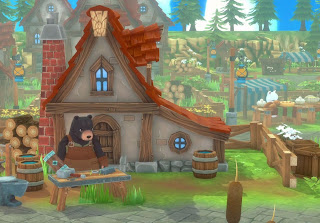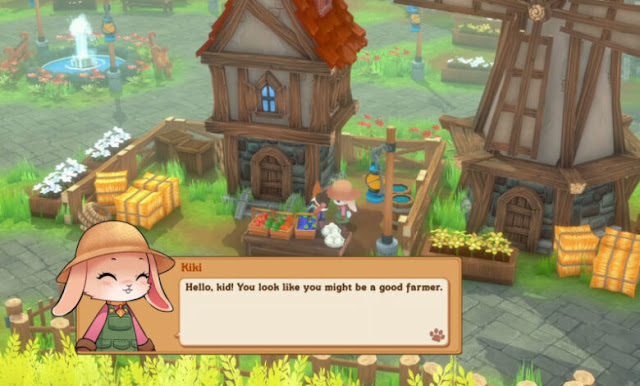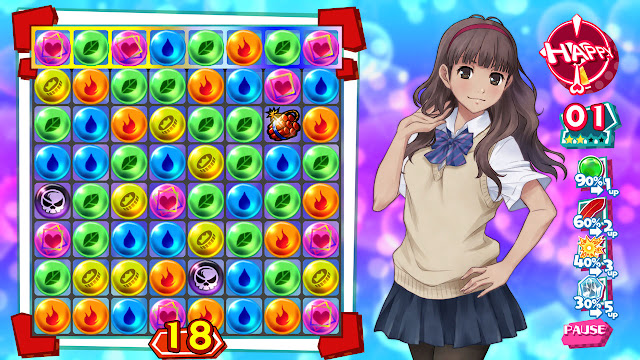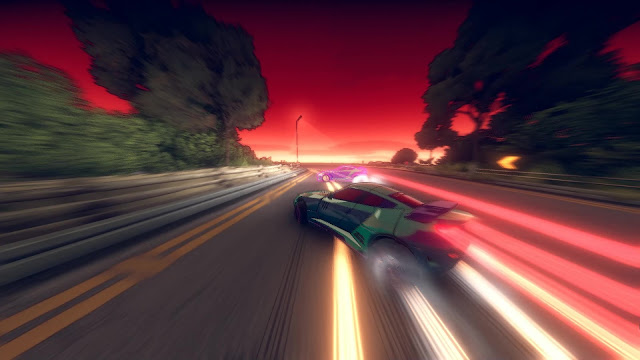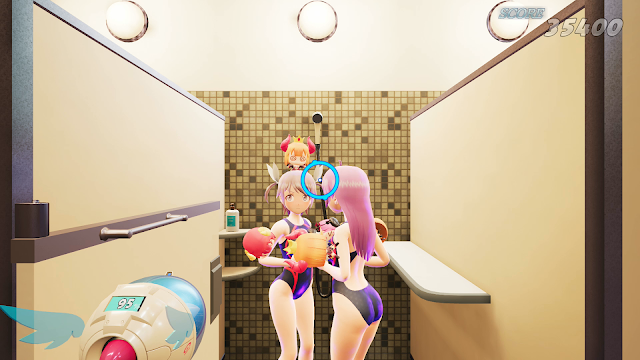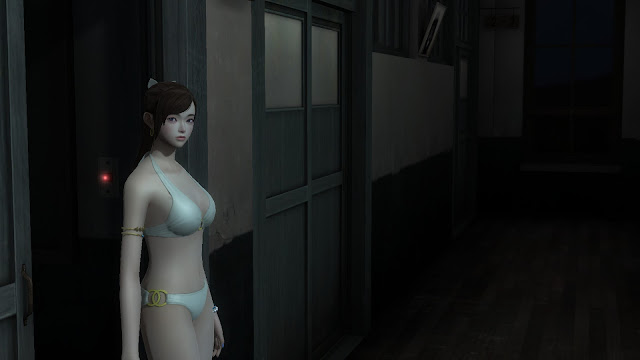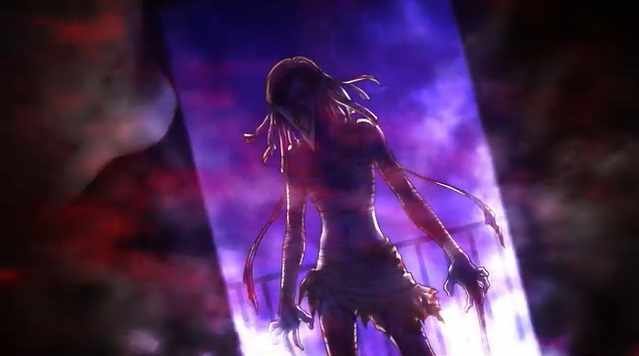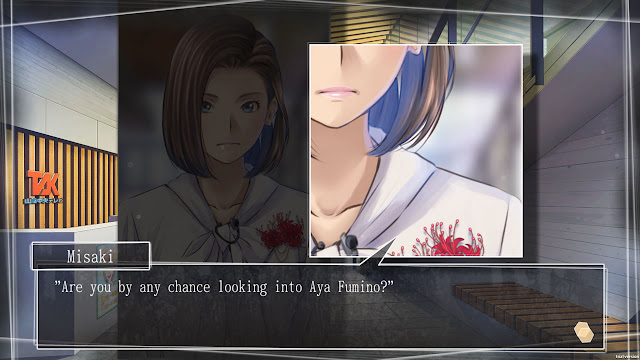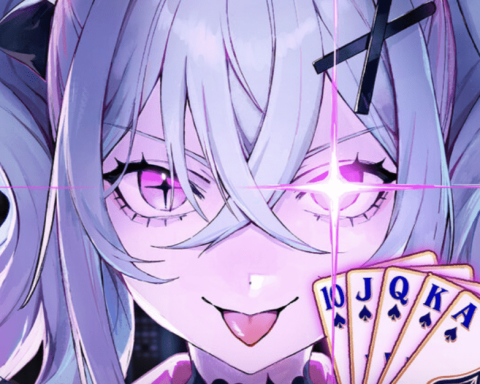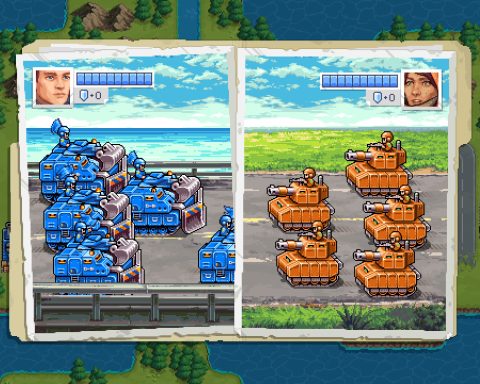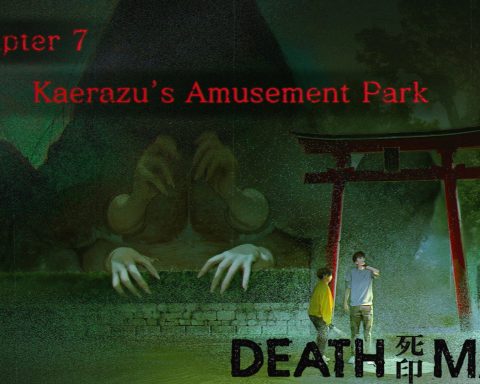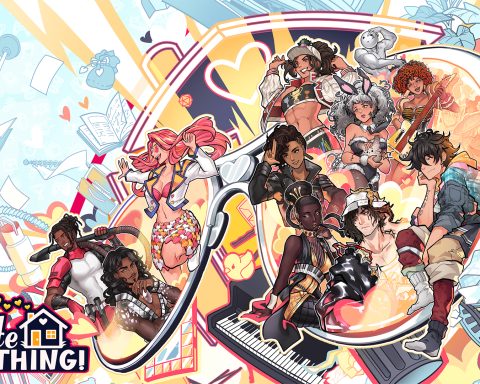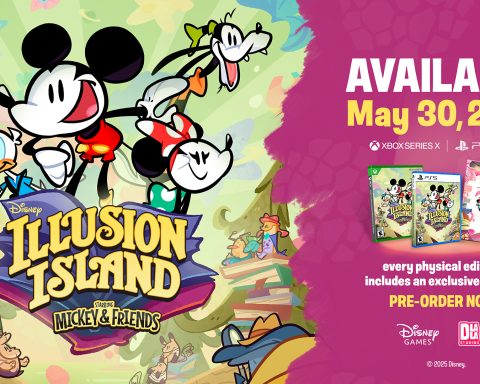Matt S: Firstly, congratulations on the announcement of your second in-house developed game, in Kitaria! It looks really lovely. Were there any particular learnings from Kotodama that have helped make this game what it is?
Geraint E: Actually, this is not quite the same as Kotodama in terms of our development involvement. Twin Hearts were already well underway with development before they initially approached us with the project. We took on the IP for Kitaria Fables and of course, have been heavily involved with feedback on how the game has been progressing – more so that some of our other publishing projects.
In terms of learning from Kotodama? Kotodama was a real eye-opener for us. As you know, that was the first time we’d been involved with a project from the ground up – shaping its development through concept to release. It was such a huge learning curve for us. It was a relatively small production as we wanted to cut our teeth on something which was not only manageable, but closely aligned to our tastes and experience.
Kitaria Fables is a significant step up from that in terms of the size of the project and also a shift towards a different type of game and genre – but I guess the philosophy behind us working on the project is similar. Finding developers who we really like and are comfortable working with, focusing on genres and art styles that we as a team are passionate about and pushing ourselves to release bigger and more complex projects.
Kotodama was really successful for us, and the temptation was always there to just make a sequel, and it’s something we discussed internally of course. I’d love to revisit it and we already have ideas and concepts for that story arc – but we also felt it was important to broaden our horizons to something different. When Kitaria Fables crossed our path, we fell in love with it and the work the developers were doing and so it felt like a natural project for us to be involved with.
Matt S: PQube is known for finding a truly eclectic, creative range of games to publish. What do you look for when taking a game project on?
Geraint E: It’s almost entirely aligned with the team’s taste in games. I guess it’s no secret that we like visual novels for example – so it’s always something we have an eye on. The team loves anime, otaku culture, beautiful pixel art, action RPGs, arcade racers, card games – we’re, initially at least, entirely informed by ‘stuff we like’.
Which sounds overly simplistic. I suppose the starting point for anything has always been ‘do we want to play this’ rather than ‘can we make loads of money from this’. Obviously, commercial success is vital, it’s what keeps us going after all – but the starting point has to be ‘do I love this game’. We see hundreds of games over the course of the year and our prospective projects are pretty much the ones that we can’t stop playing or talking about internally or are fascinated by in some way.
We also have a sort of… I don’t know, pre-disposition to support small projects I suppose. To champion something which has great potential, even if they don’t have massive development budgets. If the game has an internal champion on the team, someone who genuinely loves and wants to support it, then we’ll happily consider backing it.
Inertial Drift is a really good example of this. I’m a massive Ridge Racer and Outrun fan. It was already tentatively on my radar after I saw a tweet from the developer. I randomly bumped into the game on the show floor at GDC and honestly couldn’t stop going back to play it over that week. When I eventually got a build into our office, I’d come back from my lunch break and people were just playing it… all the time. Its moments like that when you just know its something you have to release, irrespective of what a spreadsheet might tell you about its financial potential or forecast or whatever.
It’s important to us as a publisher that people feel we’re approachable. We’ll happily look at games on all ends of the spectrum – whether it’s a bigger release like Kill la Kill or a smaller project like the excellent, STAY – we want to be able to consider all games for release, we don’t really want to be exclusionary if we can help it. That’s not how we want to set out.
I think that’s really the truth of the matter for us. If you start with the money, that that’s the only reason you’re pursuing or releasing something, it takes the heart out of the process. If you genuinely believe a game is great – for whatever reason – you’re more compelled to make it successful, and work hard to help it find its audience. If you do this right, then the commercial success will hopefully follow on from that work.
Geraint E: I guess a lot of it comes from our initial work on games like BlazBlue, Steins;Gate and Gal*Gun – the team loves anime, and so anything that has the slightest hint of that art-style is immediately interesting to us. We also have a real drive to find interesting games for a western audience that might not otherwise be considered by other publishers.
In the long distant past, I was a games journalist for ten years. Back then, when Japanese games used to come through the office, many of my colleagues simply weren’t interested in them, and so they’d fall to me to cover and review. Which suited me just fine as, honestly, I would always rather write about an obscure Japanese Game Boy Advance game, than Medal of Honor, or GTA.
I always liked that feeling of being able to introduce readers to something different – help them discover something new, something they may not have known about before. I suppose that feeling has never left me and has continued to inform my tastes. Whether it’s Valthirian Arc, or Zengeon, or White Day or A Space for the Unbound – PQube takes great pride in being able to get these titles to new, unsuspecting audiences.
The same applies to the indie side of our portfolio – helping games find a like-minded and appreciative audience is a wonderful feeling. Seeing people go, ‘oh, I would never have thought of playing this, but it’s really cool’ – I think is an important part of what we’re trying to do.
Matt S: I wanted to ask you about this next generation of consoles coming up. So much is being said about the technical power step-up, but do you think there’s anything in these consoles for indies working on more modest (technically) projects?
Geraint E: Absolutely. More power is great, of course – and I’d be lying if I said a part of me wasn’t interested in AAA projects that really push technical boundaries. But it’s a really narrow part of the gaming landscape.
It might sound like a small thing, but, take Xbox Series X’s save states as an example. I love JRPGS, but my lifestyle isn’t necessarily conducive to playing them. Wife, kids, time constraints – I can’t sit down and play a JRPG for 12 hours straight like I used to. Likewise, I can’t play for 20 minutes at a time if the save points don’t allow for that. Save states will make playing this genre possible again in a practical sense. I can start playing, and if I have to cook dinner, I can just turn it off and come back again for another 20 minutes. It’s a small feature, but actually has pretty big implications for me as a gamer. Outside of raw power, I’m interested in seeing how these smaller features can impact players and development.
One of the biggest challenges we face as a publisher with an eclectic portfolio is in getting people to break their comfort zone and try something new. For me, Game Pass really helps in breaking down that barrier. People can just dip in and out of games with relatively little financial risk – to move away from their tried and tested genres and consider playing something they may not have otherwise.
Regardless of whether PQube specifically releases games on Game Pass – the very fact that people become less afraid of trying something new can only have a positive effect on people’s habits. Diversifying the games they like, making people less scared to try something new can only be a good thing for everyone, and indie developers in particular.
In terms of the increase in power as a driving force for the industry. I think that’s seen a big shift over the years. It was always one of the main barometers in any given generation, but to a certain extent, I think the industry has diversified in a such a way that it’s not the be-all and end-all it used to be. I think people want to play a much broader range of games than before – whether they’re small pixel art indies, or text-heavy narrative adventures, or low poly survival games – there’s room for, and an appetite for, all kinds of experiences which don’t necessarily offer really high-end, big-budget production values.
The key this generation, for me, is how do platform holders make games as discoverable as possible. How do their respective eco-systems foster this growing diversity and allow a broader range of games to get a chance in the spotlight? There are so many games being released every week that this poses a significant challenge. I don’t know what the answer is on that, but I think it’s an area that needs some work – especially in the curation of storefronts. I’m really interested to see how that evolves over the coming years.
Matt S: I also wanted to ask you about fan service. A lot of your games are fanservicey, but do you see it becoming harder or easier for games to work with fanservice in the future, given industry trends?
Geraint E: That’s a good question. We recently announced that we are working with Inti Creates on Gal*Gun Returns – which is a series that’s very close to my heart. We also worked on Omega Labyrinth Z – the outcome of that project of course is very well known. We want to continue to work on these games, of course, they’re games we enjoy and so would naturally support them wherever we can.
Is it easier or harder to work on them? I think we’re definitely seeing fewer of them being made. And I’m not entirely certain how I feel about that. I think (I hope!) I echo what many fans feel about fan service games – in that for me they’ve always felt like a holiday away from more serious games. Happy, colourful, playful experiences that don’t take themselves too seriously. I think there’s a lot to be said about those games’ capacity to deliver really light-hearted silliness. I hope that there is always room for them in future.
I do take on board that they’re not for everyone – and, you know, that’s fine too. To my mind, I think it’s important to let people decide for themselves what is and isn’t the right game for them to play and at the same time, allow others do the same without judgement.
Would we continue to publish more fan service? Absolutely, if it’s the right game – and it’s a game we enjoy – we would always try to find a way to bring it to fans. We’re so happy to be working on Gal*Gun Returns, for example. We’re big, big fans of Inti Creates and of course have known the team there for many years – and the team is very emotionally invested in the series and making it a success. It’s wonderful to see the series continue and to see so many fans share our enthusiasm for the release.
Matt S: What are some of the most interesting trends that you’ve seen in video games in recent years, and where do you think they might go from here?
Geraint E: Game Pass, I’ve already touched on. I’m a big believer in that service for a number of reasons I touched on previously. Outside of that, in terms of trends which has impacted me personally…
Cross-play and cross-save might sound like a minor thing, but in the last couple of years, it’s been really important to me in terms of my gaming habits. I travel quite a bit for work, and having more games with a platform-agnostic approach has been something of a revelation.
I’m not in a hurry to buy multiple laptops, switches, Xboxes, PS4’s – so the ability for my whole family to play Minecraft together for example has been wonderful. I can play on my laptop, younger kids on Switches or phones or tablets, older siblings on Xbox or PlayStation. It’s meant that all of a sudden gaming has become much easier, more inclusive for the family as a whole.
Matt S: What are some of your goals for PQube – what do you see the company looking like, publishing, and doing in five, ten years? With most publishers, it’s easy to get a sense what they’re about, but what you’re doing is so eclectic, it’s hard to get a finger on the pulse!
Geraint E: For some time we’ve been taking each year as it comes, and by that I mean, being focused on finding games we like and are interested in, and then dedicating the time to supporting those releases to give them the best chance of success, one release at a time.
PQube started off as a distributor originally and over the years has evolved into a fully-fledged Publisher. It’s been a long road and it was great to hit the milestone of our 10th anniversary last year. We’ve grown a huge amount in that time, in both staff and resource and of course the size of our portfolio.
It’s been really heartening to see the success that we’ve had and the work that we’ve put in paying off. We always considered ourselves to be a small publisher punching above our weight, as it were – but with each passing year bringing more success than the last, we suddenly find ourselves in the position of not being quite so small any more.
It’s a nice feeling, but we’re also mindful of not being complacent and sticking to the philosophies that got us to where we are. Working on games we love, with focus and care and attention, and being welcoming to our own community.
Since the transition from distributor to publisher, we, of course, have our eye on what’s next. I think the core will remain the same in part – that is working with developers in Asia, finding indies we love and supporting them. I guess the next step for us is to continue to explore development and creating our own IP. Last year saw the beginning of that process with Kotodama, and it’s an avenue we’re really keen to explore further.
Matt S: Obviously the western side of the games industry is so overwhelmingly influential right now, but what do you think of the future of Asian game development? Does the emergence of China as a major game development centre in particular intrigue you?
Geraint E: It does. At the moment we have a real hunger for the emerging development scenes. I think we take it for granted a little in the West, as the indie scene here, in particular, is so well developed. So well developed in fact that the line between indie and ‘larger’ games has blurred so much that the dividing line is practically non-existent.
I’m personally fascinated by emerging development scenes all over the world. Making games ten to 15 years ago was pretty prohibitive. Now the tools for making games come in so many forms and they’re so accessible.
The means by which you can educate yourself on how to make a game are that much more comprehensive and easy to access, and the barrier for entry into game development is pretty low. As long as you have the drive and discipline, an internet connection and a reasonable laptop, you can teach and express yourself in-game creation relatively easily. Whether you’re using RPG Maker, or Unity, or Tyranobuilder or Unreal or Mario Maker – whatever your chosen tool is – anyone can put something together and share it with the world.
The result is that game development is accessible to all ages, to everyone regardless of background – and I think that’s fantastic news for the whole cultural and creative melting pot, and again it will only serve to increase the diversity of the games that we can experience.
Matt S: Is there any one game that you’ve wished that you were able to publish – perhaps that has never been published in the west, or another publisher handled it?
Geraint E: Ha! My team will roll their eyes if I mention Battleborn again, so I’m not going to mention Battleborn. Even if I’d really like to see Battleborn on Switch. In all seriousness, that’s a tough question actually, as I think it’s easy to just answer with my favourite games – but I think that would be too lazy an answer!
I guess one of the best examples of this is NieR. You have this game that pulled in so many different directions, was a real mix of ideas – and then when you look at the reviews of the game ten years ago, you see some which are so confused by it, in a ‘what is this garbage?!’ kind of way. As though the only way to review a game is to look at the mechanics of it – to pick apart what was ‘wrong’ with the game and then use those faults as a stick to beat it with.
And then you have other journalists who were just completely taken by it – really entered into the spirit, the heart of that game. To see it as more than just the sum of its parts. It’s really telling now, to see a game that was ignored by so many and mariginalised and berated, emerging a decade later as being this wonderful thing that so many people celebrate.
Of course, there was a lot that was ‘wrong’ with NieR, it’s by no means perfect, but I think it did so much to create an atmosphere, it had a soul that many bigger, more polished games at the time couldn’t even hope to match. I think if I was to discover it now, as a new game in development, it would be exactly the kind of thing I would love to publish.
Matt S: Finally, what can I do to convince you to bundle up the Dee Dee visual novels to publish them on Switch?
Geraint R: Ha, you know – as I said no game to small right?! It’s funny you should raise that though – as I think it illustrates my previous point really well. I’ve been reading your work for years, and I thought it was really cool to play something you’d made yourself.
I have the utmost respect for anyone who tries their hand at making a game – it’s so hard. Even a visual novel like My Time With Dee Dee is quite an undertaking – to dedicate the time to making it, writing it, figuring out how to get it all to hang together in such a way that you’re happy with it, and then share it with the world and invite scrutiny. It’s a pretty arduous emotional journey and I think it’s really easy for us to sometimes lose sight of that.
– Matt S.
Editor-in-Chief
Find me on Twitter: @mattsainsb

